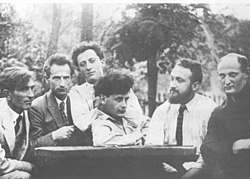Melech Ravitch
Zechariah Choneh Bergner (Yiddish: זכריה חנא בערגנער) (27 November 1893 – 20 August 1976), better known by his pen name Melech Ravitch (Yiddish: מלך ראַוויטש), was a Canadian Yiddish poet and essayist. Ravitch was one of the world's leading Yiddish literary figures after the Holocaust. His poetry and essays appeared in the international Yiddish press and in anthologies, as well as in translation.[1]
Melech Ravitch | |
|---|---|
 Melech Ravitch (second from right), with Mendl Elkin, Peretz Hirschbein, Uri Zvi Greenberg, Peretz Markish and I. J. Singer in 1922. | |
| Native name | מלך ראַוויטש |
| Born | Zechariah Choneh Bergner 27 November 1893 Redem, Galicia, Austria-Hungary |
| Died | 20 August 1976 (aged 82) Montreal, Quebec, Canada |
| Occupation | Writer, literary scholar, poet, historian of literature |
| Language | Yiddish |
| Notable works | Di Lider fun mayne lider ('The Poems of My Poems', 1954) |
| Spouse | Fanya Hartstein |
| Children | Yosl Bergner (son) |
| Relatives | Herz Bergner (brother) |
Life
Early life and publications
Bergner was born in 1893 to Efrayim and Hinde Bergner in Redem, Eastern Galicia. Leaving home at age 14, he served in the Austrian army in World War I and lived in Lemberg and Vienna. Emboldened by the 1908 Czernowitz Language Conference, he became involved in the Yiddishist movement and began writing poetry.[2] His earliest poetry appeared in Der yidisher arbeyter in 1910. Other work of the period included the 1912 collection Oyf der Shvel (On the Threshold) and 1918's Spinoza.[3]
From the early 1920s he was an active contributor of poems and essays to major Yiddish periodicals, under the name Melech Ravitch. Moving to Warsaw in 1921, he belonged to Di Khalyastre ("The Gang"), a modernist literary group which included Uri Zvi Greenberg and Peretz Markish.[4] He was a co-founder of the Yiddish literary journal Literarishe Bleter and served as secretary of the Yiddish Writers' Union, which then included Sholem Asch, Isaac Bashevis Singer, and I. J. Singer.[5]
Life in Australia and Canada
Ravitch visited Australia in 1933 to investigate the feasibility of the Kimberley Plan, and moved there in 1935.[6][7] After 1938, he moved to Argentina, Mexico, New York City, and Israel, before settling in Montreal, where he lived until his death.[1] He briefly served as head of the Jewish Public Library and revived the Yidishe Folks-Universitet (Jewish People's Popular University), which he ran from 1941 to 1954.[1] His life in Australia has been documented by Anna Epstein.[8]
Works
- Oyf der Shvel (Yiddish: אויף דער שוועל, 1912)
- Roinengroz (Yiddish: רואינענגראָז, 1917)
- Spinoza (Yiddish: שפּינאָזאֵ, 1918)
- S. S. Frug (Yiddish: ש.ש. פרוג., 1920)
- Blut oyf der fon (Yiddish: בלוט אויף דער פאָן, 1929)
- Di Fir Zaytn fun Mayn Velt (Yiddish: די פיר זייטן דער פאָן, 'The Four Sides of My World', 1929)
- Kontinentn un Okeanen (Yiddish: קאָנטינענטן און אָקעאַנען, 'Continents and Oceans', 1937)
- Mayn Leksikon (Yiddish: מיין לעקסיקאָן, 1945–82)
- 67 Lirishe, Satirishe, Natsyonale, Sotsyale un Filozofishe Lider fun di Letste Finf-zeks Yor (1946)
- Eynems Yidishe Makhshoves in Tsvantsikstn Yorhundert (Yiddish: שיינעמס יידישע מחשבות אין צוואנציקסטן יאָרהונדערט, 1949)
- Di Kroynung fun a Yungn Yidishn Dikhter in Amerike (Yiddish: די קרוינונג פון אַ יונגן יידישן דיכטער אין אַמעריקע, 1953)
- Di Lider fun Mayne Lider (Yiddish: די לידער פון מיינע לידער, 1954)
- Dos Mayse-bukh fun Mayn Lebn (1962–75)
- Iker Shokhakhti: Lider un Poemes fun di Yorn 1954–1969 (1969)[9]
References
| Wikimedia Commons has media related to Melech Rawicz. |
- Liptzin, Sol; Frakes, Jerold C.; Margolis, Rebecca (2007). "Ravitch, Melech". Encyclopaedia Judaica (2nd ed.). Thomson Gale. Retrieved 9 November 2018.
- Novershtern, Avraham (16 November 2010). "Ravitch, Melech". YIVO Encyclopedia of Jews in Eastern Europe. Retrieved 9 November 2018.
- Kreitner, Richard. "Melech Ravitch". Museum of Jewish Montreal. Retrieved 9 November 2018.
- Greenbaum, Perry J. (11 October 2017). "Yiddish Poets & Writers: Melech Ravitch". Perry J. Greenbaum. Retrieved 9 November 2018.
- Cammy, Justin D. (1 March 2009). "Hinde Bergner". Jewish Women: A Comprehensive Historical Encyclopedia. Jewish Women's Archive. Retrieved 9 November 2018.
- Rovner, Adam (2014). In the Shadow of Zion: Promised Lands Before Israel. New York: New York University Press. pp. 149–156. ISBN 978-1-4798-0457-3.
- Klepner, Frank (2004). Yosl Bergner: Art as a Meeting of Cultures. Macmillan Education. p. 46.
- Anna Epstein,Melekh Ravitsh: The Eccentric Outback Quest of an Urbane Yiddish Poet from Poland, Real Film and Publishing,(Melbourne) December 2019.
- Jeshurin, Ephim H. (1954). מלך ראַוויטש ביבליאָגראַפיע [Melech Ravitch Bibliography]. Steven Spielberg Digital Yiddish Library (in Yiddish). Amherst, Massachusetts: National Yiddish Book Center.